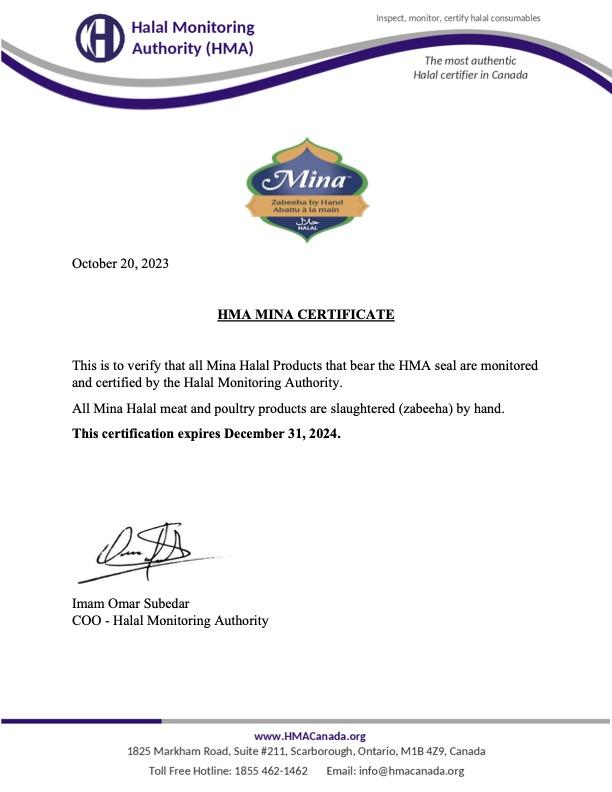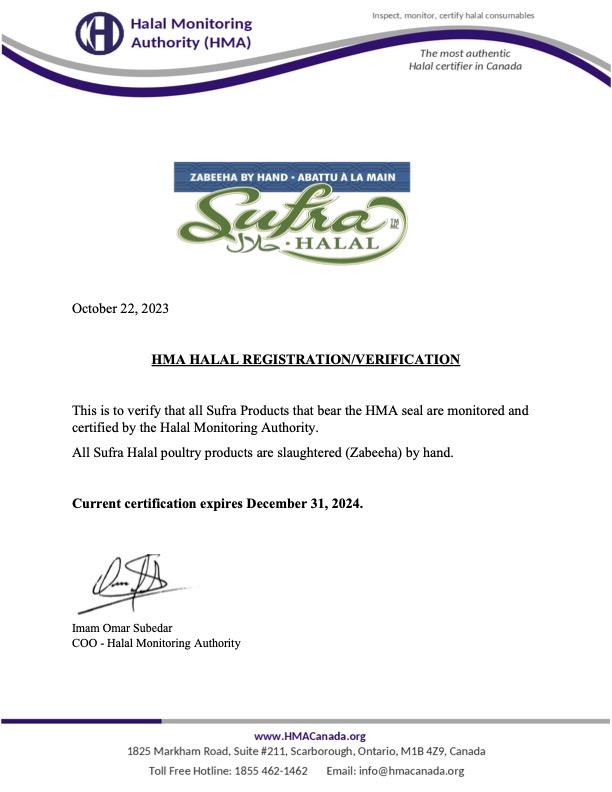At the Market Place and The Harmony Commons Dining Hall
Halal Food Standards
Halal refers to food products that are prepared following Islamic dietary laws and regulations that determine what is permissible, lawful and clean. The word halal literally means “permissible.” Haram food products are the opposite of halal, they are “forbidden.” It is important for Muslim consumers to know the Halal status of certain food products to ensure that the foods meet their dietary requirements.
Halal food standards for UTSC were created by the Food User Committee. These standards help increase awareness of the halal foods available to consumers while ensuring that clearly defined labeling practices are maintained across our campus.
As of April 2016, the Government of Canada amended the Food and Drug Regulations Act to provide consumers with more information on the production, packaging, and labelling of halal food products. Any food item claiming to be halal must include the name of the certifying body, either a third-party organization or individual certified to oversee the production of the food items to ensure regulations are followed. Currently, Food Services is working towards updating our own Food Standards and will be addressing this amendment.
This document provides an outline of the halal standards at the University of Toronto Scarborough, including formal definitions and procedures for campus food service providers preparing Halal foods.
For more information about food standards at the University of Toronto Scarborough Food Partnerships food@utsc.utoronto.ca
Definitions
Halal foods are prepared by following Islamic dietary laws and regulations which determine what is permissible, lawful and clean.
According to Islamic guidelines, halal food is safe and not harmfully prepared; it does not contain non-halal and najs (unclean) ingredients; and it is processed and manufactured using equipment that is not contaminated with things that are najs.
Halal meat at the UTSC has been slaughtered according to the Islamic method using the Zabiha process which requires that the name of Allah is pronounced at the time of slaughtering, that the animal is facing Mecca, and that a quick movement of a sharp blade severs the veins and arteries of the neck to permit the drainage of blood and minimize suffering for the animal. The Zabiha process improves the taste, shelf-life and healthiness of meat.
Halal Food Standards
In accordance with Agriculture and Agri-Food Canada, the University models the rules and regulations set out by the Islamic Food and Nutrition Council of America (IFANCA), a non-profit technical Islamic organization that certifies and supervises the production of halal products.
Foods labeled as halal contain only ingredients that are completely permissible for ingestion by the Islamic faith and have not come into contact with non-halal food.
Halal food items include:
- Zabiha meat (beef and lamb) and poultry.
- Fish with scales.
- Animal-derived products extracted from Zabiha animals.
- Milk and eggs of all permissible animal species.
- Vegetables, fruit, and grains except those that cause intoxication.
- All vegetable ingredients except those that cause intoxication.
- No alcohol in any form.
In addition, the University only distributes halal food from ISNA or IFANCA certified suppliers. A complete list of halal food products and certified suppliers can be found at www.ifanca.org.
The following products at the MarketPlace are Halal:
- Pizza Station – pepperoni halal certified
- Deli station – sliced turkey and roast beef halal certified
- Grill station – chicken and beef halal certified
- Home station – chicken and beef halal certified
- Pho – chicken halal certified
- Pasta station – chicken halal certified
Disclaimer: For further information, please ask to speak with a culinary team member or manager on location, or e-mail food@utsc.utoronto.ca
Preparation and Avoiding Cross-Contamination
The Halal Standards at the University of Toronto ensure that all aspects of preparation, processing, packaging, and distribution of halal foods are free from any najs materials.
Halal food preparation utilizes safety controls including the Hazard Analysis and Critical Control Points (HACCP) food safety system as implemented by the Canadian Food Inspection Agency. The University of Toronto prepares halal food in HACCP environments with strict controls on allergens and cross-contaminants.
Employees preparing halal food receive training regarding halal food laws, regulatory requirements and proper food preparation techniques.
Not sure what to eat?
Need dietary advice?
Have questions about nutrition?
E-mail your questions to dietitian@utsc.utoronto.ca
-
Sourced from https://foodservices.utoronto.ca/halal/
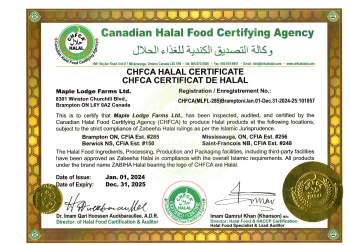
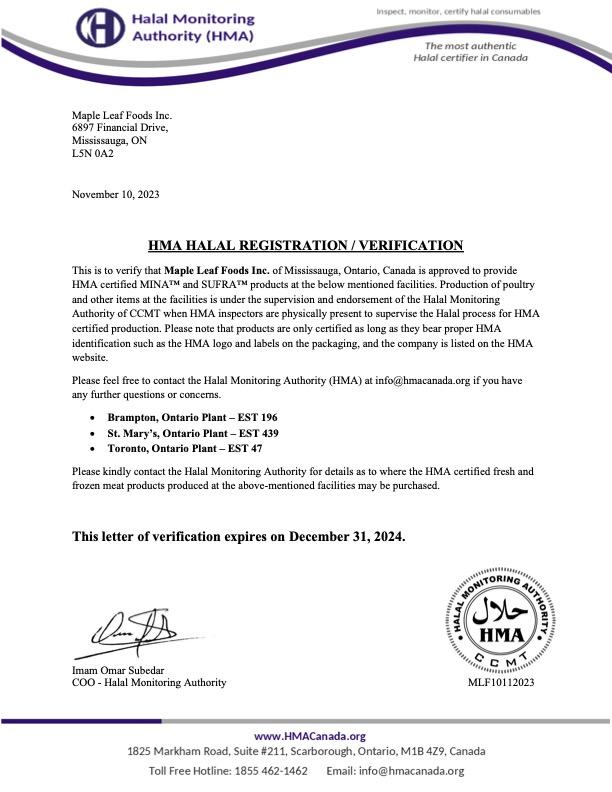
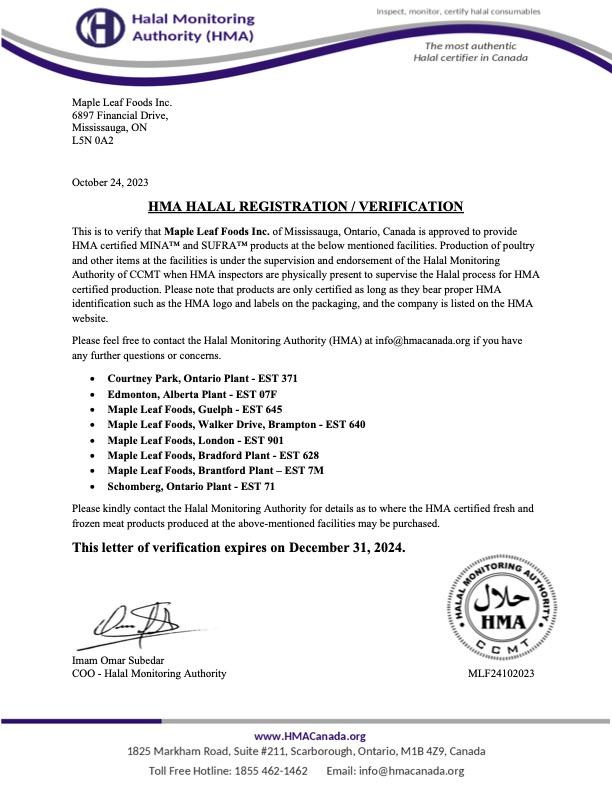
HMA (Halal Monitoring Authority) Letter
